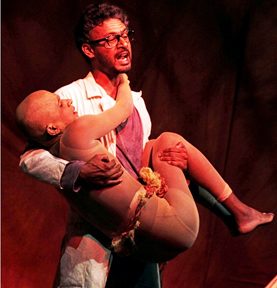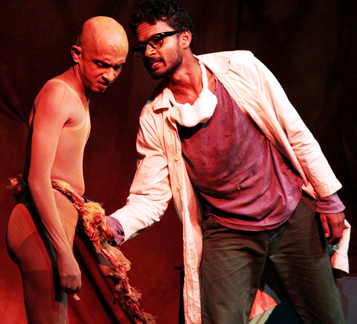|
DRAMA REVIEW
The womb of society’s conscience
A review of Gabsava
by Dilshan Boange
On March 12, seated in the gentle darkness of the Lionel Wendt I watched Thilak
Nandana Hettiarachchi’s Gabsava (The Abortion) come ‘alive’. What was
‘delivered’ through this play was very much a strong socio-political critique
built on exploring the physiological domain of the act of ‘foeticide’ through
the two principal ‘entities’ that would be involved in an abortion – the doctor
as the ‘abortionist’ and the foetus as the unborn child who becomes the ‘abortee’.
It is presented to take the form of a dialogue that develops between an
executioner and the person condemned to death. The politics of the play clearly
posits itself as within the antiabortionist camp. The main argument is possibly
that the foetus is presented as an entity that is very much a fully live human
being despite still being within the womb. One of the principal arguments that
comes from a pro-abortionist outlook is that until a foetus is born its ‘status’
as a ‘living person’ is debatable.
 In Sri Lanka the law declares the abortion of an unborn child as a crime unless
sanctioned by court on the basis of certain exceptional circumstances permitted
by law, such as when an abortion is medically declared as crucial to save the
mother’s life. Pro-abortionists who call for reform of this law cite that the
law impinges on the right of a woman to decide over her body. Therefore, in
effect an unborn child’s ‘ownership’ is asserted collectively by society as the
argument would suggest. However, as Gabsava dialogically discourses, society
does not necessarily give the assurance to the unborn child it purports to claim
ownership over, complete care and protection after it is born. Survival
afterwards is another game the child must learn to play. And reaching ‘success
in life’ is a battle to be fought systematically. In Sri Lanka the law declares the abortion of an unborn child as a crime unless
sanctioned by court on the basis of certain exceptional circumstances permitted
by law, such as when an abortion is medically declared as crucial to save the
mother’s life. Pro-abortionists who call for reform of this law cite that the
law impinges on the right of a woman to decide over her body. Therefore, in
effect an unborn child’s ‘ownership’ is asserted collectively by society as the
argument would suggest. However, as Gabsava dialogically discourses, society
does not necessarily give the assurance to the unborn child it purports to claim
ownership over, complete care and protection after it is born. Survival
afterwards is another game the child must learn to play. And reaching ‘success
in life’ is a battle to be fought systematically.
A One Act play performed by two unnamed characters –the doctor and the foetus,
Gabsava is a compelling stage play that stands on a powerful script. The
perturbing dialogic discoursing and character interplay that offer moments that
are touching, striking, and at times witty and humorous also deal a feeling of
benumbing. The accomplishment of the performance must be attributed to the power
of the script as well as the skill of the actors and the acuteness of direction.
The players - Jagath Manuwarna as the doctor, and Saman Hemarathana who plays
the foetus, delivered superb performances and must be saluted wholeheartedly.
The stage set can be thought of as either an abstract design that represents
symbolically
the environment of the foetus (the womb) as well as the elements that
characterise the role of the doctor in terms of medical paraphernalia; or a
surreal setting which could also suggest that the whole drama unfolds in the
imagination of the doctor who would then be presenting something of a ‘dreamt
vindication’ for himself within his own consciousness. Therefore, this play may
even be interpreted as a dream seen by a doctor who is pained by a conscience in
crisis as an abortionist.
From a theoretical point of argument for academic analysis of the play, one must
note that the voice of the foetus is, whatever said and done, a hypothesis to
suit the need of a creative work and cannot have the same weight of ‘realistic
validity’ as the voice of the doctor.
But then again considering the fact that a doctor (or any person) really cannot
have an actual verbal dialogue/interaction with a foetus at all in real life,
the realistic ground for the doctor can at most be established in terms of his
representation of a plausible moral dilemma which can be verbalised, although
the foetus must be perceived as a symbolic manifestation of the perspectives and
perceptions conceived through the adult human mind which can represent to a
great extent facets of shared societal thought on the subject of abortion and
the perceived rights of the unborn child.
 The arguments put forward by the foetus and the moral issues brought to debate
by him after all cannot actually represent the state of mind of an actual unborn
child. Therefore, what is seen is the societal debate on abortion given a
creative rendition that presupposes the unborn child’s ‘purity’ and ‘innocence’
when approaching from a humanist angle to view ‘human morality’ at times being
hypocritical and inhuman. In certain respects the doctor asserts that he is
actually doing the unborn child a favour by sparing him from facing the miseries
and brutishness of a cruel world. The arguments put forward by the foetus and the moral issues brought to debate
by him after all cannot actually represent the state of mind of an actual unborn
child. Therefore, what is seen is the societal debate on abortion given a
creative rendition that presupposes the unborn child’s ‘purity’ and ‘innocence’
when approaching from a humanist angle to view ‘human morality’ at times being
hypocritical and inhuman. In certain respects the doctor asserts that he is
actually doing the unborn child a favour by sparing him from facing the miseries
and brutishness of a cruel world.
This I suppose is one of the best moral justifications an abortionist could
present. The foetus rebuffs this argument asserting that it is his business
about how he should cope with the world, and that he should be given the chance
to experience it.
Views of patriarchal society and ‘legitimacy’ of a child with respect to
‘parentage’ takes centre stage as the contentious debate dramatises showing the
doctor speaking in terms of societal views while the foetus speaks of
‘singularised’ needs and asserts his claim as an individual whose right to live
should not be determined by ‘society’. The foetus in the play is a male.
As I sat in seat Q-7 watching the play, I wondered what dynamics to the
arguments would come into play if the foetus was a girl!
Gabsava depicts the polarity between what law prohibits and morality permits.
Although the law is meant to reflect morality, is that really so in this case?
Although abortion is generally against the ‘law’, the impulsion to destroy an
unborn child conceived as a result of ‘immorality’ makes abortion, at times, an
act that carries a tacit sanctioning from ‘morality’.
This is a play that reflects the deeper dilemmas belying the times we live in as
we try to reconcile morality with conceptions of individual rights, societal
claims over the individual, and the law. Gabsava is indeed a work of theatre
that speaks of the dichotomy within our collective conscience. |

